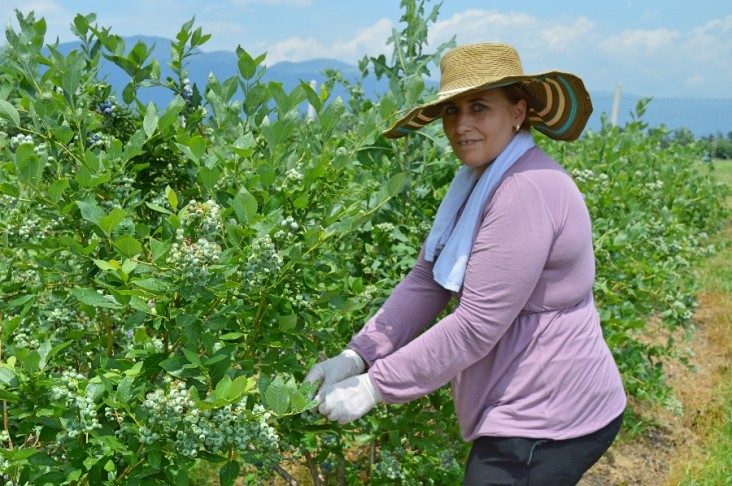Speeches Shim

August 2018 — Making the move from an administrative job in the Netherlands to growing blueberries in western Kosovo has had its ups and downs for Besnik Lila.
In Kosovo, blueberries are currently grown on a modest 50 hectares in total, over six different production zones involving 20 growers.
Three years after its establishment, Lila’s farm, which is called Boost Berries, is a model for local agribusinesses, and blueberry cultivation is expected to spread into other areas of the country where growing conditions are right. The farm has become the largest blueberry operation in the country.
Kosovo enjoys a very favorable climatic condition for high-quality production, with the country’s blueberry harvest coming to market at least 30 days before the main competition in Eastern Europe.
In November 2015, a USAID grant helped Boost Berries to install a modern drip-irrigation and fertigation system for blueberries, obtain the international food safety certificate for primary production, and provide internships for newly graduated agronomists on the farm.
The biggest challenge, according to 41-year-old Lila, who is co-owner of the farm, is steadying the farm’s operations with seasonal workers.
While seasonal jobs are often an extra source of income, for some workers such jobs are their sole source of income. At this local blueberry farm on the outskirts of Peja, about 100 seasonal workers found work this blueberry season as harvesters. They are mainly women who live in the villages around Boost Berries.
As each seasonal worker receives a fixed daily rate and a bonus fee of 0.40 euros (46 cents) per blueberry kilogram collected, some of these women earn up to an impressive 700 euros ($811) per month. This amount is twice as high as the average salary in Kosovo’s private sector.
“I was so happy when they told me I could come and work,” explained Minire Kelmendi, a first-time harvester at the farm. “I have learned what it is like to work for such a professional farm, with professional managers. My family supports me working here, and the income is very much needed. I will continue to work here every summer, if they’ll have me.”
“It’s important for me to see my workers happy,” explained Lila. “Some of these village women have never worked in their lives, and here at the farm they are making 37 to 38 euros a day. I really think we have a good payment system in place. It’s good seasonal work and it pays well for these hard workers.”
The 4.2-hectare farm — which will soon expand to a huge blueberry plantation — is located in the village of Vitomirica in the municipality of Peja. It is so modern and successful that it doesn’t resemble the usual Kosovo farm. The farm produces eight varieties of blueberries, yielding up to 50 tons of high-quality fruit.
“We had 15 newly graduated agronomists working as interns at the farm, assisted by the USAID grant. We have offered full-time jobs to three of them,” says Lila. “Today, if you ask me whether I would hire an agronomist with 20 years of experience or a young graduate, I wouldn’t think twice about taking on a newly graduated agronomist as they learned rapidly and were able, applying all systems correctly to the tee, which is very important in farming.”
The farm recently began exporting the berries to the Netherlands. From there the product is distributed across Europe through the farm’s Dutch partners.
The owners of the farm have great plans for the future. Working with Dutch investors, starting this autumn, they plan to increase the production area with another 60 hectares of cultivated blueberries, turning it into an impressive 65-hectare blueberry operation. The expansion will involve hiring seasonal staff of 800 to 1,000 workers. Consequently, local villagers looking for work will have much to be grateful for in terms of additional seasonal opportunities and wages.
USAID’s Agriculture for Growth and Rural Opportunities, a five-year activity that started in 2015, focuses on increasing agricultural productivity, marketability and responsiveness to markets. The program is designed to enhance the sustainability and competiveness of targeted Kosovo agribusinesses in domestic and export markets. To date, the program has established over 3,400 hectares of farmland with improved technologies and has facilitated over $70 million in sales.
LINKS
Follow @USAIDKosovo, on Facebook, on YouTube

Comment
Make a general inquiry or suggest an improvement.